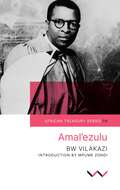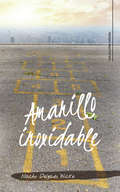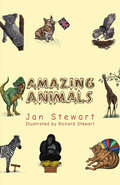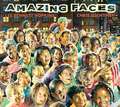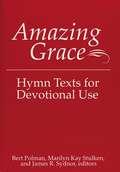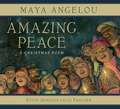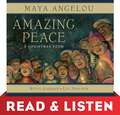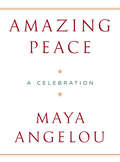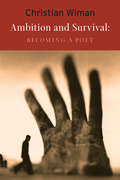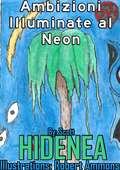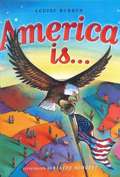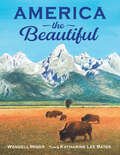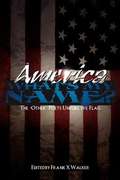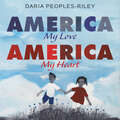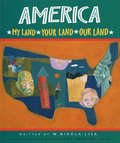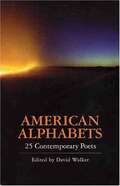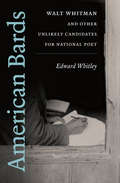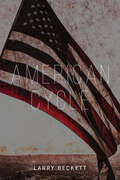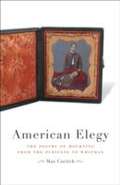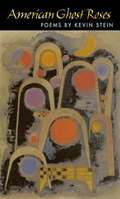- Table View
- List View
Amahlokohloko Izinkondlo ZesiZulu: UBC Contracted
by E J Mhlanga J J ThwalaAmahlokohloko – Yiqoqo lezinkondlo zekhethelo elihlelwe yizingwazi zolimi o – E. J. Mhlanga no Dkt. J. J. Thwala. Lihlelelwe ibanga leshumi nambili. Yiqoqo elidla imihlanganiso ngalezizathu ezilandelayo: – Liqukethe izinkondlo zolimi lwasekhaya nezolimi lokwengeza. – Lithinta izingqikithi ezahlukeneyo: ezemfundo, ezothando, ezemvelo nezinye. – Liqukethe impilomlando yezimbongi, incazelo yamagama ajiyile nokuhluzwa kwezinkondlo ezithile. – Imibuzo yohlolo ihlelwe kwalandelwa isitatimende sikazwelonke. Yiqoqo elilungele amabanga emfundo nokuqeqesha okuqhubekayo nawaphakeme.
Amahlokohloko Izinkondlo ZesiZulu: UBC Uncontracted
by E J Mhlanga J J ThwalaAmahlokohloko – Yiqoqo lezinkondlo zekhethelo elihlelwe yizingwazi zolimi o – E. J. Mhlanga no Dkt. J. J. Thwala. Lihlelelwe ibanga leshumi nambili. Yiqoqo elidla imihlanganiso ngalezizathu ezilandelayo: – Liqukethe izinkondlo zolimi lwasekhaya nezolimi lokwengeza. – Lithinta izingqikithi ezahlukeneyo: ezemfundo, ezothando, ezemvelo nezinye. – Liqukethe impilomlando yezimbongi, incazelo yamagama ajiyile nokuhluzwa kwezinkondlo ezithile. – Imibuzo yohlolo ihlelwe kwalandelwa isitatimende sikazwelonke. Yiqoqo elilungele amabanga emfundo nokuqeqesha okuqhubekayo nawaphakeme.
Amal’ezulu
by Benedict Wallet VilakaziAmal’ezulu (Zulu Horizons), first published in 1945 in the Bantu (later, African) Treasury Series by the University of the Witwatersrand Press, was the second volume of poetry produced by the renowned Zulu author B.W. Vilakazi. It was written during the ten years he spent living in Johannesburg, in ‘exile’ from his birthplace, KwaZulu-Natal. The poems in this collection represent a turning point in Vilakazi’s life; they express yearnings for the beloved land, animals and ancestral spirits of his rural home, as well as expressions of deep disillusionment with the urban life he encountered in the ‘City of Gold’, and in particular the suffering of the black miners who brought this gold to the surface but never experienced the benefits of the wealth it produced for the mine owners. Vilakazi was deeply conscious of the subhuman system that held these miners in its grip, and gave voice to their suffering in many of the poems in the collection, in particular the now famous poem ‘Ezinkomponi’ (‘On the mine compounds’).Renowned as the father of Nguni literature, Vilakazi was both a traditional imbongi (bard) and a forward-looking poet who could fuse Western poetic forms with Zulu izibongo (praise poetry). In these poems he assumes the role of the voice of the voiceless, and gives poignant expression to the stoic endurance of those caught up in the brutalities of capitalist exploitation of African labour, and the appalling injustices of the migrant labour system.
Amarillo inoxidable
by Nacho Delgado WickeDe la fortuna poco saqué; de los infortunios, demasiado. Amarillo inoxidable reúne 110 micropoemas, aforismos y greguerías, los cuales -pese a su breve esqueleto- tratan de abrir brecha en el asfalto humano.
Amaruka
by N. P. UnniOn the life and works of Amaru, a Sanskrit poet, including his depiction of love in his poetry.
Amazing Animals
by Jan StewartHere is an animal anthology for the enjoyment of children, parents or teachers. The illustrated poems will amuse and entertain but have interesting factual information and related activities to stimulate further learning at home or in school. So, if you wish to know the name of the most famous St. Bernard dog, how to tell a crocodile from an alligator, what giraffes do with their long necks when they sleep, whether owls really say ‘tu-whit tu-whoo’ plus many other amazing animal facts, do read on.
Amazing Faces
by Lee Bennett Hopkins Chris K. SoentpietPoems focusing on universal emotions, as expressed by poets from diverse backgrounds, including Joseph Bruchac, Nikki Grimes, Lee Bennett Hopkins, Pat Mora, Janet S. Wong, and many others.
Amazing Grace: Hymn Texts for Devotional Use
by Bert Polman Marilyn Kay Stulken James Rawlings SydnorThe editors describe this book as "a hymnal for the home." Words to hymns are written as poetic verses and are organized around such typical worship categories as hope, faith, praise, etc.
Amazing Grace: Inspirational Poetry
by Donovan MitchellDonovan Mitchell has been serving God faithfully for the last 28 years. His confinement to a wheelchair, has not deterred neither has it dampened his spirit, and love for the church and for his Lord. The poetic gift that God has impregnated him with has been a blessing to the local church in particular and to the community in general. At Mount Carmel Church Donovan Mitchell is accepted and accommodated as a human being of equal dignity and standing (status). I believe that the dissemination of the message of the love of God, inherent and tangible in the poems will administer the mercies of heaven to the reader of this inspirational poetry born from heaven. The motivational ambiance of this body of poetic works, is the fulfillment of the prophecy that God gave to Donovan on the 4th January 2003 when the spirit said to him, "write down your feelings on a piece of paper..." Amazing Grace Inspirational poetry is the result of his obedience to the voice of the Spirit on that faithful day.
Amazing Peace: A Christmas Poem
by Maya Angelou Steve Johnson Lou FancherIn this beautiful, deeply moving poem, Maya Angelou inspires us to embrace the peace and promise of Christmas, so that hope and love can once again light up our holidays and the world. "Angels and Mortals, Believers and Nonbelievers, look heavenward," she writes, "and speak the word aloud. Peace."Read by the poet at the lighting of the National Christmas Tree at the White House on December 1, 2005, Maya Angelou's celebration of the "Glad Season" is a radiant affirmation of the goodness of life and a beautiful holiday gift for people of all faiths.From the Hardcover edition.
Amazing Peace: A Christmas Poem
by Maya AngelouIn this beautiful, deeply moving poem, now beautifully narrated in this Read & Listen edition, Maya Angelou inspires us to embrace the peace and promise of Christmas so that hope and love can once again light up our holidays and the world. &“Angels and Mortals, Believers and Nonbelievers, look heavenward,&” she writes, &“and speak the word aloud. Peace.&”Narrated by the poet at the lighting of the National Christmas Tree at the White House on December 1, 2005, Maya Angelou&’s celebration of the &“Glad Season&” is a radiant affirmation of the goodness of life and a beautiful holiday gift for people of all faiths.This ebook includes Read & Listen audio narration.
Amazing Peace: A Christmas Poem
by Maya AngelouThis dazzling Christmas poem by Maya Angelou is powerful and inspiring for people of all faiths.In this beautiful, deeply moving poem, Maya Angelou inspires us to embrace the peace and promise of Christmas, so that hope and love can once again light up our holidays and the world. &“Angels and Mortals, Believers and Nonbelievers, look heavenward,&” she writes, &“and speak the word aloud. Peace.&” Read by the poet at the lighting of the National Christmas Tree at the White House on December 1, 2005, Maya Angelou&’ s celebration of the &“Glad Season&” is a radiant affirmation of the goodness of life.
Ambition and Survival
by Christian Wiman"That calling, at once religious, ethical, and aesthetic, is one that only a genuine poet can hear--and very few poets can explain it as compellingly as Mr. Wiman does. That gift is what makes Ambition and Survival, not just one of the best books of poetry criticism in a generation, but a spiritual memoir of the first order." --New York Sun"This weighty first prose collection should inspire wide attention, partly because of Wiman's current job, partly because of his astute insights and partly because he mixes poetry criticism with sometimes shocking memoir ... The collection's greatest strength comes in general ruminations on the writing, reading and judging poetry." --Publishers Weekly"[Wiman is] a terrific personal essayist, as this new collection illustrates, with the command and instincts of the popular memoirist ... This is a brave and bracing book." --Booklist"Blazing high style" is how The New York Times describes the prose of Christian Wiman, the young editor transforming Poetry, the country's oldest literary magazine.Ambition and Survival is a collection of stirring personal essays and critical prose on a wide range of subjects: reading Milton in Guatemala, recalling violent episodes of his youth, and traveling in Africa with his eccentric father, as well as a series of penetrating essays on writers as diverse as Thomas Hardy and Janet Lewis. The book concludes with a portrait of Wiman's diagnosis of a rare form of incurable and lethal cancer, and how mortality reignited his religious passions.When I was twenty years old I set out to be a poet. That sounds like I was a sort of frigate raising anchor, and in a way I guess I was, though susceptible to the lightest of winds. . . . When I read Samuel Johnson's comment that any young man could compensate for his poor education by reading five hours a day for five years, that's exactly what I tried to do, practically setting a timer every afternoon to let me know when the little egg of my brain was boiled. It's a small miracle that I didn't take to wearing a cape.Christian Wiman is the editor of Poetry magazine. His poems and essays appear regularly in The New Yorker, The Atlantic Monthly, Harper's, and The New York Times Book Review.
Ambizioni Illuminate al Neon
by Scott Hidenea Riccardo41 poesie ed illustrazioni derivate da esperienze di vita ricorrenti, innate in questo mondo moderno. Una combinazione sia di ispirazioni dirette che indirette mescolate con motivi fluorescenti illuminati
America Is ...
by Louise BordenIn words and pictures, this is a great salute to a great country, the land of freedom for us, and for people all over the world. In her poetic text, Louise Borden evokes with bold strokes the many aspects of our nation-its farmlands, its prairies, its cattle country, its cities, its rivers and the many kinds of people who live and work here. Mountains and deserts, waterfalls and beaches-each of our states has special things to see and enjoy. And all over this country our flag flies, with fifty stars for our current fifty states and thirteen broad stripes for our original thirteen colonies.
America the Beautiful
by Wendell MinorClassic Americana and patriotism meet in this picture book version of the beloved song "America the Beautiful."Katharine Lee Bates's timeless and beloved poem alongside art by award-winning author and artist Wendell Minor, capturing the magnificent beauty of the United States. Celebrate America's ideals of togetherness and marvel at classic illustrations of her natural and historical wonders: from Yosemite National Park and the Garden of the Gods, to Mount Rushmore and Plymouth Plantation. This reissued edition includes an updated introduction, information about the poet, the composer of the song, the sheet music, a map and brief information about all twenty-one American locations depicted in the book.
America the Beautiful in the Words of Walt Whitman
by Editors of Country BeautifulThe editors of Country Beautiful take the readers into the life of Walt Whitman by sharing Whitman’s writings at different levels of his development. Interspersed with his writings, are editorial historical comments that place Whitman’s poems and prose within the appropriate historical context. From this, the readers gain a glimpse into Whitman’s mind, heart, and spirit, and view of social justice. The photographs that the editors chose to put into this volume add to the vibrancy of Whitman’s work.
America! What’s My Name: The "Other" Poets Unfurl the Flag
by Frank X. WalkerA multi-cultural anthology of modern poetry.
America, My Love, America, My Heart
by Daria Peoples-RileyAmerica, do you love me? Acclaimed author-artist Daria Peoples-Riley invites readers to answer timely—and timeless—questions beating inside the hearts of children across America. Exquisitely illustrated, with a powerful, lyrical text, America, My Love, America, My Heart will challenge readers of all ages to examine and evaluate personal beliefs and attitudes toward the many different colors of America. America, do you love me? My black. My brown. My pride. My crown. What begins as a single question from a single child multiplies as America, My Love, America, My Heart sweeps across the country with every page turn, inviting in more and more children of color—and their questions. Does America love them when they speak? Or whisper? Or shout? When they stand? Does America love them just as they are? Inspired by the questions of her own childhood, author and artist Daria Peoples-Riley has created a powerful and important book for Americans of all ages—an essential addition to every bookshelf and classroom. Her poetic text encourages readers to confront bias, prejudice, and discrimination and invites readers to reflect and respond with their own answers, while honoring the identities of black and brown children and people of color.The unforgettable monochromatic oil paintings incorporate patriotic colors—red, white, and blue—to evoke deeply felt emotion and unique perspective. This rich, resonant book is a conversation starter for children, for families, for classrooms, and for communities.
America: My Land, Your Land, Our Land
by W. Nikola-Lisa<p>America is made up of opposites: Our land boasts majestic high mountains and vast lowlands. America is also a land of contrasts: We are a rich nation, yet so many are poor. The America of this book, rendered with imagination and vision by 14-outstanding artists from diverse backgrounds, is the America that our children see around them. America: My Land, Your Land, Our Land is a visual celebration of America and a challenge to our children to cherish it, because they will one day inherit it. <p>Guided Reading: E <p>Lexile: NP <p>Interest Level: Grades K - 4 <p>Reading Level: Grades 2 - 2 <p>Themes: Comparing/Classifying/Measuring, Nature/Science, United States History, Identity/Self Esteem/Confidence, Responsibility, Neighbors, Native American Interest, Muslim/Muslim American Interest, Multiethnic interest, Latino/Hispanic/Mexican Interest, Home, History, Environment/Nature, Cultural Diversity, African/African American Interest, Asian/Asian American Interest, Exploring Ecosystems, Human Impact On Environment/Environmental Sustainability , Respect/Citizenship, Pride
American Alphabets: 25 Contemporary Poets
by David WalkerThis anthology introduces readers to twenty-five American poets of the last decades of the twentieth century. Each poet is introduced by a short critical essay, followed by a representative sample of their work. Poets include Agha Shahid Ali, Rita Dove, Mark Doty, and Linda Gregerson.
American Bards Walt Whitman and Other Unlikely Candidates for National Poet
by Edward WhitleyWalt Whitman has long been regarded as the quintessential American bard, the poet who best represents all that is distinctive about life in the United States. Whitman himself encouraged this view, but he was also quick to remind his readers that he was an unlikely candidate for the office of national poet, and that his working-class upbringing and radical take on human sexuality often put him at odds with American culture. While American literary history has tended to credit Whitman with having invented the persona of the national outsider as the national bard, Edward Whitley recovers three of Whitman's contemporaries who adopted similar personae: James M. Whitfield, an African American separatist and abolitionist; Eliza R. Snow, a Mormon pioneer and women's leader; and John Rollin Ridge, a Cherokee journalist and Native-rights advocate. These three poets not only provide a counterpoint to the Whitmanian persona of the outsider bard, but they also reframe the criteria by which generations of scholars have characterized Whitman as America's poet. This effort to resituate Whitman's place in American literary history provides an innovative perspective on the most familiar poet of the United States and the culture from which he emerged. Walt Whitman has long been regarded as the quintessential American bard, the poet who best represents all that is distinctive about life in the United States. Whitman himself encouraged this view, but he was also quick to remind his readers that he was an unlikely candidate for the office of national poet, and that his working-class upbringing and radical take on human sexuality often put him at odds with American culture. While American literary history has tended to credit Whitman with having invented the persona of the national outsider as the national bard, Edward Whitley recovers three of Whitman's contemporaries who adopted similar personae: James M. Whitfield, an African American separatist and abolitionist; Eliza R. Snow, a Mormon pioneer and women's leader; and John Rollin Ridge, a Cherokee journalist and Native-rights advocate. These three poets not only provide a counterpoint to the Whitmanian persona of the outsider bard, but they also reframe the criteria by which generations of scholars have characterized Whitman as America's poet. This effort to resituate Whitman's place in American literary history provides an innovative perspective on the most familiar poet of the United States and the culture from which he emerged.
American Cycle: Version 2
by Larry BeckettAmerican Cycle, a sequence of long poems inspired by our folklore and past, was written over forty-seven years. Its themes are love, local mythology, history, justice, memory, accomplishment, time. "The books are extraordinary, sustained explosions of authentic American language and energy. Each is entirely different from the others in style, voice, form and narrative content; each so rich in imagery and nuance and texture and event and so finely crafted. . . " —Paul Williams, author of Bob Dylan: Performing Artist.American Cycle holds Spanish words loaned from Old California, rough colloquialisms in Paul Bunyan, the power of African-American vernacular English in John Henry, bare oratory in Chief Joseph, old west phrases in Wyatt Earp, circus ballyhoo in P. T. Barnum, aviation jargon in Amelia Earhart, backwoods dialect in Blue Ridge. As Walt Whitman says, "I hear America singing, the varied carols. . .”
American Elegy: The Poetry of Mourning from the Puritans to Whitman
by Max CavitchPracticed and read form of verse in America, "elegies are poems about being left behind," writes Max Cavitch. American Elegy is the history of a diverse people's poetic experience of mourning and of mortality's profound challenge to creative living.
American Ghost Roses
by Kevin SteinIn his first book as the poet laureate of Illinois, Kevin Stein shoulders an array of poetic forms, blending pathos, humor, and social commentary. These poems--ranging from meditative narratives to improvisational lyrics--explore art's capacity to embody as well as express contemporary culture. Stein embraces subjects as various as his father's death, magazine sex surveys, Kandinsky's theory of art, the dangling modifier, Jimi Hendrix's flaming guitar, racial bigotry, and a teacher's comments on a botched poem. Presiding over this miscellany are ghosts of a peculiarly American garden of dreamers and beloved misfits, those redeemed and those left fingering the locked gate

